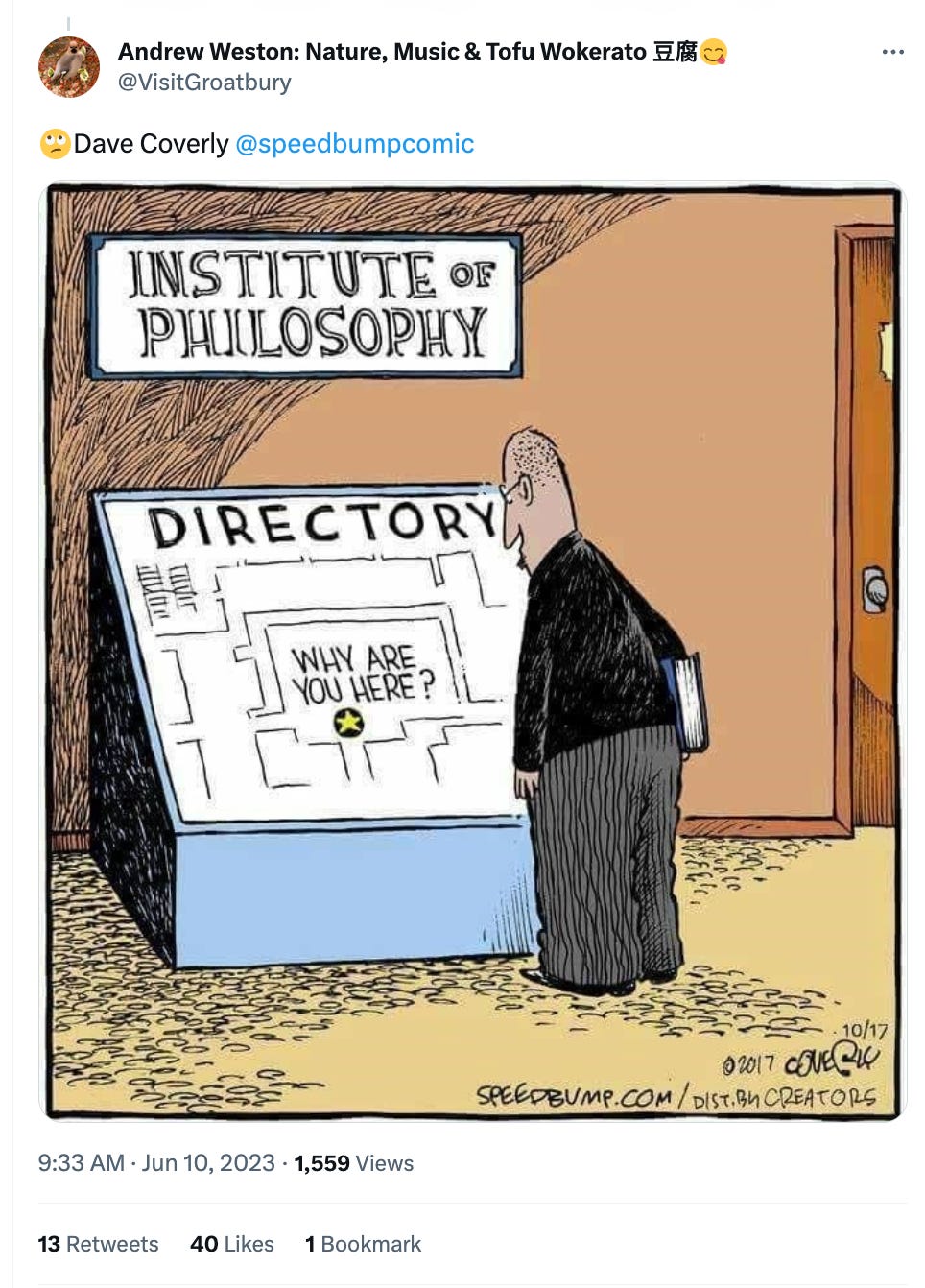Risk: are we protecting the kids or the system?
In this thought-provoking episode of Uncomfortable Collisions with Reality, Nicholas Gruen and guest Jarrod Wheatley, founder and CEO of PIC Professional Individualized Care, delve into the complex issue of risk in out-of-home care for children. As they explore the challenges faced by those involved in child protection, they discuss the delicate balance between prioritizing the child's well-being and managing organizational risk. Drawing parallels to the institutional imperative and transparent decision-making, this episode sheds light on the need for thoughtful consideration and empathy when navigating the intricacies of the out-of-home care system. If you prefer to just listen to the audio, the file is here.
(That’s ChatGPT saying it’s thought provoking, which is a bit rich given that ChatGPT has never had a thought in it’s life.)
AI’s Existential Risk to Humanity: the case against
I broadly agree with this, which (to paraphrase Groucho) may not be saying much for it. This piece I wrote on embodied cognition and the poverty of Cartesian thinking should give you the flavour of the way I’d put the argument, but Blair Fix makes the same argument in a more concrete way. He reasons that if the machines are going to take over, they’ll need to start with a hearty breakfast.
[L]ets talk about the nightmare scenario, played out in movies like Terminator and The Matrix. The general idea is that machines become so advanced that they overthrow their human masters and conquer the world. The idea is legitimately terrifying. It is also wildly unrealistic.1
To see the problem, ask yourself a simple question: what does the AI eat for breakfast? Here’s my point. When you start thinking about breakfast, you become aware of how your body sustains itself, mostly in ways you’re oblivious to.
In a modern setting, things start with the complex supply chain that brings food to your mouth. Where did that food come from? Who grew it? How would machines develop a similar supply chain to meet their material needs?
Moving a step lower, how is it that you body ‘knows’ how to digest food? The answer is not located in your brain — in your so-called ‘intelligence’. The answer lies in billions of years of evolution that have perfected your cellular metabolism.
Your cells ‘know’ how to use food to sustain themselves, even if you have no idea what’s going on. Your cells also ‘know’ how to reproduce, passing on this ability to you, an intelligent being who is blissfully unaware of its own competence. How on earth would machines replicate this ability?
Holding onto this question for a moment, let’s return to the idea of finding and digesting breakfast. Today’s machines may be ‘intelligent’, but they have none of the core competencies that make life robust. We design their metabolism (which is brittle) and we spoon feed them energy. Without our constant care and attention, these machines will do what all non-living matter does — wither against the forces of entropy.
In other words, if humans stopped maintaining the server farm on which ChatGPT runs — cut the repair work and cut the power — how long would the ‘intelligence’ last? A few seconds at best.
Still, perhaps machines could learn to sustain themselves and self-replicate? Maybe they could. But the scale of the problem is immense. We delude ourselves if we think otherwise.
Here’s the main problem that AI fearmongers don’t understand. The core competency of life — survival and reproduction — is not achieved by passively ingesting information. It is rarely achieved by concious ‘knowing’. Instead, it is achieved by incessantly interacting with the environment. It is achieved by exquisitely vast trial and error. It is achieved by mindless evolution.
Could lots of bad things come from AI — sure could. And maybe the terrified ones are right after all. Maybe humangoes with AI could empower a takeover of others with AI and somehow participate in some ‘leapfrogging’ process whereby AI solves the kind of bootstrapping problems Fix’s reference to breakfast encompasses. But that’s not something I’d claim to be able think very coherently about.
But could AI be used for bad purposes? Is the Pope a Catholic?
Astounding
Jane Jacobs on cities
A few months ago I listened to Jane Jacobs’ classic book The Death and Life of Great American Cities and it struck me that her concerns were the same concerns I’ve written a lot about in systems of social support that governments run — like NDIS, child protection and so on.
The system she writes about is essentially a physical one — city planning. So it is easier for her to point out and propose remedies to the tyranny of system planning than it is when the system and what’s happening in it is less visible as with social systems. Anyway, I didn’t write it up when I was reading it — so I was glad to see this substack summary of the book (with the very pretty Midjourney image above).
And Jacobs was more than a critic of rationalist planning. Her ideas have become foundational to a grassroots, decentralized approach to city development. She offered this striking alternative vision. She advocated and agitated for that vision. She made it a reality. And she wasn’t shy about expressing herself. Here are some examples:
There is no logic that can be superimposed on the city; people make it, and it is to them, not buildings, that we must fit our plans…. We can see what people like.
and
In this dependence on maps as some sort of higher reality, project planners and urban designers assume they can create a promenade simply by mapping one in where they want it, then having it built. But a promenade needs promenaders.
and
The pseudoscience of planning seems almost neurotic in its determination to imitate empiric failures and ignore empiric success.
and
His aim [Ebenezer Howards'] was the creation of self sufficient small towns, really very nice towns if you were docile and had no plans of your own and did not mind spending your life with others with no plans of their own. As in all Utopias, the right to have plans of any significance belonged only to the planner in charge.
As a journalist and activist, working in the mid-to-late 20th century, Jacobs ambitiously and vigorously challenged the orthodoxies of urban planning. This included criticism of the Garden City model popularized by Ebenezer Howard and the Radiant City model pioneered by Le Corbusier. Jacobs seems a bit more hostile to Corbusier's ideas. Her opus, The Death and Life of Great American Cities (1961) contains robust critiques of these approaches and much more. Generally, Jacobs viewed plans that favored large-scale redevelopment, low-density suburbs, segregated land uses, and car-oriented designs as destructive to city vitality. She goes to great lengths in her book to chronicle how these designs destroy the vitality, building diversity, and safety of urban neighborhoods. Some of the ideas are quite surprising like her defense of large sidewalks and her concerns with large, unmonitored parks. Her radically different vision for city life is, evidently to any reader, founded on a wellspring of experiences and keen observations. Her mid-century ideas as detailed in this masterwork of urban theory still have enduring influence today, and, thus, worth exploring.
Woke madness and the first major invasion in Europe since WWII
No, I’m not seeing the equivalence but Jordan Peterson is. Here’s a takedown of his position David Deutsch linked to on Twitter.
I want to focus on a specific claim by Peterson—that Russia has not only gone to war to protect itself from what he describes as Western degeneracy, but that our alleged degeneracy robs the West of the moral high ground in the conflict. Here’s a key quote:
And are we degenerate in a profoundly threatening manner? I think the answer to that may well be yes. The idea that we are ensconced in a culture war has become a rhetorical commonplace. How serious is that war? Is it serious enough to increase the probability that Russia, say, will be motivated to invade and potentially incapacitate Ukraine merely to keep the pathological West out of that country, which is a key part of the historically Russian sphere of influence?
And what is this degeneracy? Peterson talks about radical gender ideology, the nomination of Ketanji Brown Jackson (yes, really), and her reluctance to define a “woman” during her confirmation hearings. Here’s more Peterson:
The culture war in the West is real, and culture is losing. And Russia is part of the West. And the culture war is now truly part of why we have a war, and it’s a real war. And it is certainly the case that we do not therefore have all the moral high ground, for some part of the reasons that [political scientist John] Mearsheimer details, and for these reasons of insanity. In fact, how much of it we have at all is something rightly subject to the most serious debate.
I’m not sure more need be said. And I wasn’t about to use an hour of my life which I’ll never get back to watch more of Jordan Peterson’s pathological self-absorbtion, but if you’ve not got to that stage, knock yourself out.
Anyway, it’s not that the moral high-ground is a great place to be in a war — you know how the west represents democracy and all that — the same democracy that brought you the January 6 invasion of the US Congress in 2021. And I always chuckle when some folks talk about the ‘rules based order’ — you know the one that brought you Iraq, Vietnam and the bombing of Cambodia. But without too much self-righteousness we could try to defend an order in which invasions are collectively resisted.
Brad Delong on The Authoritarian Right’s Lies It Tells Itself Today
I first came across this mode of thought in a passage by the excellent historian C.V. Wedgwood,trying to defend the fact that, at its lowest ebb, the Protestant Dutch Revolt of the late 1500s was composed of a bunch of pirates: “When a torch is all but extinguished it is poor policy to complain because its flame is smoky and smells of pitch.”
The party line over at The American Conservative—and others of its ilk—seems to be the same: patriarchy and religiosity have no chance of resisting liberalism if they fight fair, and will fall unless we rightists abandon our institutions that have kept us free and enthusiastically support, and in fact hand control of our destiny over, to people we admit are quite unpleasant.
And, of course, The American Conservative and its ilk all avert their eyes completely from the fact that the quite unpleasant people to whom they submit themselves completely and unthinkingly are not true believers in the cause but rather in it for the grift. Trump is not a foe of divorce or of birth control.Putin is not an Old Believer:
Michael Warren Davis: What Russia Means: ‘I want to tell you why Western elites hate Russia…. if we are being honest—which, again, I’m not sure we can be—our elites hated Russia long before she invaded Ukraine. What is more, that hatred helped to precipitate the invasion…. Russians lived under a regime of brutal state atheism for the better part of a century…. The church in Russia today is descended from those men and women who persevered in the faith through a century of vicious persecution…. Russia is not a Christian utopia…. Nor am I saying that Russia will become a Christian paradise. That is up to the Russian people, and God, if we’re getting technical….
Why our elite hates Russia—and why it has always hated Russia. Here in the West, our conventional wisdom holds that the church is on its last legs…. “Christian values” are an anachronism. We are on the cusp of a new age: an age of freedom, of tolerance, of unbelief. This is the end of history. Russia stands as a living rebuke to this narrative. Traditional, supernatural faith is rebounding…. The resurrection of the Russian Church is nothing short of a miracle. And our Western elites will do everything in their power to keep us from witnessing that miracle. That is why they have been on the war path against Putin for the last twenty years….
We hate Russia because they are mean to the gays. Deacon Nicholas Kotar, the great novelist and translator, gave a wider view: “What the Russian government is doing is setting a red line to the spread of NGO-style liberal democracy. And Ukraine, unfortunately, has been a buffer zone, and a kind of test-case, for the spread, not of a political system, but of a system of values, that is espoused by the elites only.... The problem is that with all these colored revolutions, no matter how you look at it, the thing that comes in together with the money is an insistence, unfortunately, on the adoption of the Western liberal cultural milieu. It happened in Georgia, it happened in Ukraine, it happened everywhere…”.
There is a Christian renaissance underway in Russia, which is nothing short of a miracle…. Western elites want us to believe that the triumph of “NGO-style liberal democracy” is inevitable everywhere. But it’s not. Russia is living proof of that. Her story should give us hope. But that is the very last thing our ruling class wants us to have…
Absolutizing and abstraction, conservation and piety
Alan Jacobs on ideological hyperventilation.
Some years ago I wrote a post on what I called “the absolutizing of fright”:
I have the same questions about the notorious “Flight 93 Election” essay, which says “2016 is the Flight 93 election: charge the cockpit or you die.” And also says, “a Hillary Clinton presidency is Russian Roulette with a semi-auto.” And also says, “we are headed off a cliff.” Later our pseudonymous author says that conservatives will be “persecuted,” will be “crushed,” and under a Hillary presidency America will be “doomed.” But what precisely is he talking about? It’s absolutely impossible to tell. He doesn’t give even a hint.
Under a Clinton presidency, would socially-conservative evangelical Christians like me have been fired from our jobs, driven from our homes by the military, and sent to re-education camps? Would we have been forced to sign some sort of Pledge of Allegiance to the Sexual Revolution, under threat of imprisonment? What?
This kind of rhetoric — featuring an undefined alarm and an undefined response to that alarm — has if anything escalated and spread since then. For instance, in a recent essay Paul Kingsnorth talks about allowing the concept of “the West” to die:
Maybe we need to let this concept fall away. To let it crumble so that we can see what lies beneath. Stop all the ‘fighting’ to preserve something nobody can even define, something which has long lost its heart and soul. Stop clinging to the side of the sinking hull as the band plays on. We struck the iceberg long ago; it must be time, at last, to stop clinging to the shifting metal. To let go and begin swimming, out towards the place where the light plays on the water. Just out there. Do you see? Beyond; just beyond. There is something waiting out there, but you have to strike out to reach it. You have to let go.
I have never been sure what people mean by “the West” either, so I hold no brief for the term. But Kingsnorth’s counsel? I have absolutely no idea what he might mean. I can’t even guess. It’s in the same disaster-porn mode as “The Flight 93 Election,” though Kingsnorth features a sinking ocean liner rather than a crashing plane. But I don’t understand the image. I don’t know how it translates into beliefs or actions, though whatever it means, it’s consistent with having a Substack, I guess. Might it also be consistent with preserving and transmitting the best ideas and the greatest achievements of those cultures that we typically identify with “the West”?
Along similar lines: last year Josh Askonas published an essay called “Why Conservatism Failed,” in which he wrote, “We can no longer conserve. So we must build and rebuild and, therefore, take a stand on what is worth building.” I don’t understand this either. If you’re rebuilding something aren’t you conserving some elements of it — or at the very least the memory and the idea of it?
The lemonade stand
Which, having watched Duck Soup four and a half decades ago, I happened upon in this review. (Which is not good enough to be in this august company.) It does however have a good image of the book it’s reviewing — viz:
Crossover fruitcake watch
Kennedy still believes that Senator John Kerry won the 2004 election, which re–elected George W. Bush, owing largely to a loose analysis of exit polls, voting machines and precinct vote counts – echoing many of the false claims made by Trump and his supporters about the 2020 election. As for the 2020 race, which Biden won, he said, “I don’t know. I think that Biden won.”
He dismisses concerns that his candidacy could help Trump or another Republican win. Kennedy has suggested he will not support Biden, who he calls a friend, if the President wins the nomination, because of his approach to the Ukraine war. …
The conspiratorial style of politics – the idea that the powerful secretly shape events with malevolent goals – runs like white noise through American history, punctuated by occasional revelations of actual schemes that did demonstrable harm, such as in the Catholic Church, the tobacco industry or the intelligence community, for example. …
He denounces Russian President Vladimir Putin’s invasion of Ukraine, but also blames Americans for provoking the war by supporting the 2014 popular uprising in the country. Like Trump, he says he would quickly negotiate a peace if elected. Unlike most Democrats, he has called former Fox News host Tucker Carlson “breathtakingly courageous” for his criticism of drug companies.
Kennedy still believes that Senator John Kerry won the 2004 election, which re–elected George W. Bush, owing largely to a loose analysis of exit polls, voting machines and precinct vote counts – echoing many of the false claims made by Trump and his supporters about the 2020 election. As for the 2020 race, which Biden won, he said, “I don’t know. I think that Biden won.”
He authored a 2005 article for Rolling Stone and Salon.com alleging that mercury in vaccines had caused a rise in neurological disorders like autism that was later withdrawn by both publications after multiple corrections. The Centres for Disease Control and Prevention has posted a two-page explainer to debunk claims of mercury harm in vaccines, citing nine different studies, including six that were published after his article. …
And so on.
Now living in California with his third wife, actress Cheryl Hines [who plays “Cheryl” in Larry David’s Curb Your Enthusiasm, he has six children.
Agreeable and ideological: an intriguing suggestion
A 2015 study found:
… used higher pitch and varied their pitch more when interacting with their child than with adults. The fathers, on the other hand, did not show the same pattern, and instead talked to their children using intonation patterns more like when they talked to other adults.
As an instinctive speaker of so-called ‘motherese’ – that is, baby talk – I find that when our son mispronounces a word (‘tawtah’ for ‘water’ or ‘mulack’ for ‘milk’) I will automatically echo it back to him, while my husband will automatically respond with the correct pronunciation. These differences persist despite the fact that we share childcare almost exactly equally within our family.
It turns out … it may well have some adaptive purpose. "We think that maybe fathers are doing things that are conducive to their children's learning but in a different way,” writes VanDam, “the parents are complementary to their children's language learning.” Mothers speak down to children, while fathers speak to them like equals – in combination, these two kinds of stimuli promote the development of adult language. …
One trait on which men and women differ substantially is agreeableness. To put it bluntly, women are usually nicer than men. … This nurturing instinct often finds its way into polling on political questions. For instance, a typical study from 2017 asked 3,014 college students the following question: “If you had to choose, which do you think is more important, a diverse and inclusive society or protecting free speech rights.” 61% of male students chose to prioritise free speech, compared with only 35% of female students – exactly what you would expect from two populations that differ in this most crucial of traits. …
The problems arise when an agreeable style of politics gloms onto a group that seems to offer plentiful opportunities for babying. Right now, it is trans people who have found themselves in the hot seat (or the high chair). … Observe … the trans celebrity Dylan Mulvaney’s recent appearance on Drew Barrymore’s talkshow, which culminated with Barrymore kneeling on the ground, looking Mulvaney straight in the eye, and offering a heartfelt pep talk on self-love. Some gender critical feminists looked at this scene and saw a woman prostrating herself before a man. What I saw was a mother kneeling down to reassure a young child – for some bizarre reason, Barrymore was speaking motherese to a grown adult on national TV.
At the risk of stating the obvious, trans people are not babies. Nor are they pets. They do not need earplugs and snacks to withstand an academic discussion, and they do not need to be spoken to like toddlers. Real two-year-olds may benefit from the gentleness of motherese. The rest of us need to grow up.
























